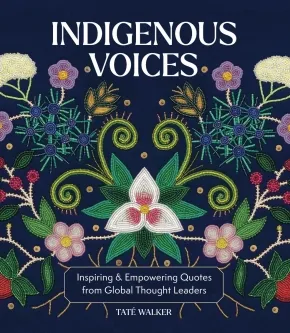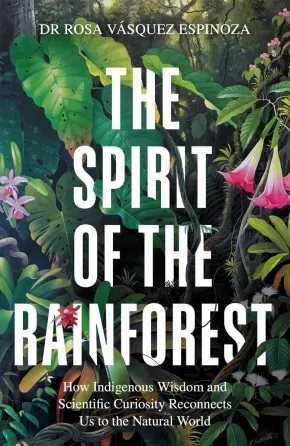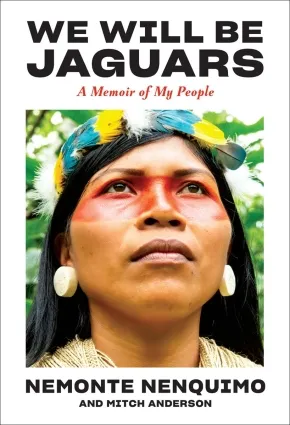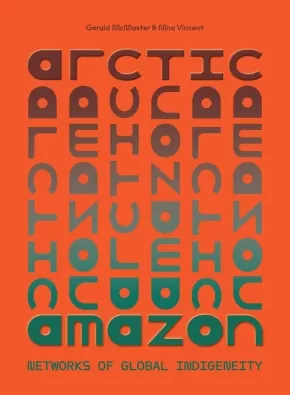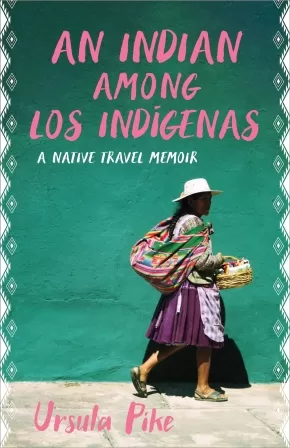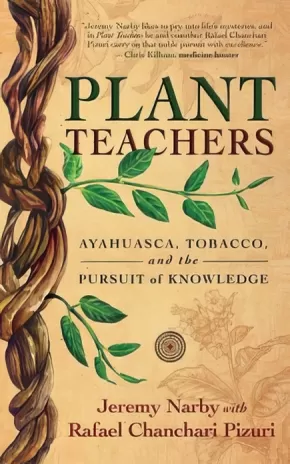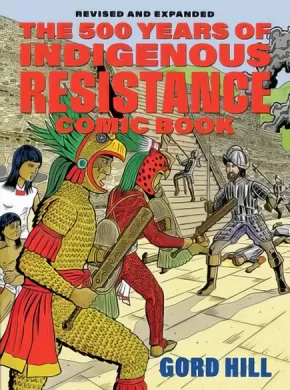
Indigenous Peoples in South America
1
-
8
of
8 Results;
Sort By
Indigenous Voices: Inspiring & Empowering Quotes from Global Thought Leaders
$25.99
Format:
Hardcover
Text Content Territories:
Indigenous Canadian; Indigenous American; Indigenous South American;
Reading Level: N/A
ISBN / Barcode: 9781577154914
Synopsis:
Synopsis:
Immerse yourself in Indigenous Voices, an inspiring volume of quotations by Indigenous thought leaders, activists, politicians, and scholars illustrated with stunning artwork by Indigenous artists.
This captivating book weaves together the timeless wisdom of Indigenous people from various nations and regions through a mosaic of more than 60 quotes, words, and stories by elders, leaders, activists, scholars, and influential contemporaries spanning all walks of life. Discover the diverse and unique heritage of extraordinary people like:
- Shina Novalinga – A member of the Inuk living in Montreal, Canada, Shina Novalinga is a content creator, singer, and activist who shares her Inuk culture across social media, of which an important aspect is traditional throat singing with her mother.
- Natali Segovia – A member of the Quechua, Natali Segovia is the Executive Director of the Water Protector Legal Collective and a human rights attorney. Her advocacy focuses on defending Water Protectors and human rights defenders facing repression for their activism.
- Corrina Gould – Of the Ohlone, Corrina Gould is the chair and spokesperson for the Confederated Villages of Lisjan, the Co-Director for the Sogorea Te' Land Trust, and the lead organizer for Indian People Organizing for Change.
- Elias Not Afraid – A member of the Apsáalooke (Crow), Elias Not Afraid is a mega-award-winning queer beader and fashion designer. He says, “When people think of native beadwork, they think trinkets and good luck charms and dream catchers but it’s far from it. I create wearable art that is durable and can be used daily and last over a lifetime and be used as a family heirloom.”
- Lily Gladstone – An American actress from the Blackfeet Reservation, Gladstone is of Piegan Blackfeet, Nez Perce, and European heritage. They earned critical acclaim for portraying Mollie Kyle, an Osage woman who survived the Osage Indian murders in Martin Scorsese’s film Killers of the Flower Moon, among other important roles in film and television.
- Kola Shippentower – A member of the Umatilla, Shippentower is the first Native American player for the Oregon Ravens, a tackle football team for women and non-binary players.
- Shiloh Maples – Of the Odawa, Maples is a citizen of the Little River Band of Indians based in Michigan. Through her interest in Indigenous food systems and her own Ojibwe and Odawa heritage, she developed the program Sacred Roots for the American Indian Health and Family Services in Detroit, where she taught cooking classes and promoted dishes using traditional, seasonal, and local ingredients in a way that improved participants’ health while connecting them with their culture.
- Alvera Sargent – Sargent, of the Akwesasne Mohawk, worked with the Akwesasne Freedom School, one of the oldest Indigenous language schools in North America. “My hope for our tribal community at large is that more of our people come back to our traditional space. I am grateful that our time has come as Indigenous people are being recognized for their traditional knowledge systems. The community is recognizing that Indigenous people do have the wisdom of our ancestors to share, which helps all areas of our society.”
- And more!
Indigenous Voices offers a unique opportunity to connect with ancient traditions, refresh your perspective with modern insight, and gain awareness and understanding that resonate across cultures and generations.
Additional Information
192 pages | 7.5" x 8.6" | Hardcover
Spirit of the Rainforest: How Indigenous Wisdom and Scientific Curiosity Reconnects Us to the Natural World
$34.99
Format:
Hardcover
Text Content Territories:
Indigenous South American;
Reading Level: N/A
ISBN / Barcode: 9781856755566
Synopsis:
Synopsis:
A competing title to the bestselling Braiding Sweetgrass - a fascinating insight into the Amazon rainforest from scientist and peruivan-born explorer Dr Rosa Espinoza.
Before you step into the jungle, there are a few things you need to know...
Join scientist Dr Rosa Vasquez Espinoza as she uncovers one of the most unexplored regions on the planet.
Dr Rosa is no stranger to the Amazon. Growing up with the rainforest as her back garden, she learnt the lessons of the rainforest from her grandmother, a native healer in natural medicine. She went on to pursue a classical education in science, gaining a PhD in the US, but has always been pulled back to the heart of the Amazon. As a leading biologist in her field, Rosa continues to explore the region through a unique blend of scientific inquiry and ancient insight.
In this debut, you'll learn about Dr Rosa's journeys in the Amazon: her treacherous encounters with a boiling river, her conservation work with stingless bees, her experience of taking ayahuasca as a natural psychedelic - and all the amazing biodiversity of the rainforest.
At the heart of Rosa's expedition is her passion to combine science with the indigenous knowledge of the Amazon. She shares her experience of learning from the indigenous communities that she visits, and shows what they have to teach us - stretching beyond the realm scientific knowledge. Here Rosa learns the most important lessons in how to reconnect to the natural world - and, in turn, will teach us to do the same.
In this book, Rosa celebrates the richness of Amazonian culture, the wonders of biodiversity, and the enduring spiritual connections between humanity and the natural world.
Additional Information
336 pages | 6.45" x 9.65" | Hardcover
We Will Be Jaguars: A Memoir of My People
$35.00
Format:
Hardcover
Text Content Territories:
Indigenous South American; Indigenous Peoples in Ecuador; Waorani ;
Reading Level: N/A
ISBN / Barcode: 9781419763779
Synopsis:
Synopsis:
From a fearless, internationally acclaimed activist comes an impassioned memoir about an indigenous childhood, a clash of cultures, and the fight to save the Amazon rainforest
We Will Be Jaguars is an astonishing memoir by an equally astonishing woman. Nenquimo is a winner of TIME magazine’s Earth Award, and MS. magazine named this book among the Most Anticipated Feminist Books of 2024.
Born into the Waorani tribe of Ecuador’s Amazon rainforest—one of the last to be contacted by missionaries in the 1950s—Nemonte Nenquimo had a singular upbringing.
She was taught about plant medicines, foraging, oral storytelling, and shamanism by her elders. At age fourteen, she left the forest for the first time to study with an evangelical missionary group in the city. Eventually, her ancestors began appearing in her dreams, pleading with her to return and embrace her own culture. She listened.
Two decades later, Nemonte has emerged as one of the most forceful voices in climate change activism. She has spearheaded the alliance of indigenous nations across the Upper Amazon and led her people to a landmark victory against Big Oil, protecting over a half million acres of primary rainforest. Her message is as sharp as a spear—honed by her experiences battling loggers, miners, oil companies and missionaries.
In We Will Be Jaguars, she partners with her husband, Mitch Anderson, founder of Amazon Frontlines, digging into generations of oral history, uprooting centuries of conquest, hacking away at racist notions of indigenous peoples, and ultimately revealing a life story as rich, harsh, and vital as the Amazon rainforest herself.
Reviews
“If you want to understand the climate crisis and do something about it, read this book. Nemonte’s writing is as provocative as it is inspiring, a heroine speaking her truth which is exactly what we need to hear. Had we listened long ago to these voices we wouldn’t be in the eye of the storm now.” — Emma Thompson
“We Will Be Jaguars is the story of the humanity and fierce determination of Nemonte Nenquimo, one of the most effective leaders for Indigenous rights and environmental justice. In her gripping memoir, Nenquimo shares her journey from childhood to warrior leader, fighting the forces of greed and destruction that threaten the Waorani People and their vast, spectacular rainforest. Her story highlights the love and strength required to overcome the forces that threaten our planet.” — Laurene Powell Jobs, founder and president, Emerson Collective
“On one level, Nemonte Nenquimo’s memoir is inspiring, moving, and unforgettable; a rarely seen, firsthand insight into a childhood spent in the Amazon rainforest and the extraordinary story of her fight to save it from oil companies. On another level, this intimate and motivating book should spur action from all of us: the fight to save our planet from exploitation is something that affects us all and is the responsibility of us all. Nenquimo’s leadership and example should shame those of us in industrialized countries into changing the way we live and the way we see our world.” — Rowan Hooper, author of How to Save the World for Just a Trillion Dollars
“Everyone should read this––never has a book been more urgent. Truly soul-stirring, Nemonte’s book is a radical manifesto for our times. It moved me to tears. Her story flows like a mighty river, and I was utterly taken by its current.”— Vanessa Kirby, actress and activist
"Full of wisdom, sadness, flourishes of joy and more than a few psychedelic visions, We Will Not be Saved is testament not only to Nenquimo’s resilience but also her deep spiritual connection to her land and ancestors. ... [It] plant[s] readers right in the heart of the rainforest, immersing them in its sounds, smells and kaleidoscopic landscapes. Many are the memoirs that profess to tell untold stories, but here that claim is watertight." — The Guardian
Additional Information
368 pages | 6.00" x 9.00" | Hardcover
Arctic/Amazon: Networks of Global Indigeneity
$60.00
Editors:
Format:
Hardcover
Text Content Territories:
Indigenous Canadian; Indigenous South American;
Grade Levels: 12; University/College;
ISBN / Barcode: 9781773102993
Synopsis:
Synopsis:
Arctic/Amazon: Networks of Global Indigeneity offers a conversation between Indigenous Peoples of two regions in this time of political and environmental upheaval. Both regions are environmentally sensitive areas that have become hot spots in the debates circling around climate change and have long been contact zones between Indigenous Peoples and outsiders — zones of meeting and clashing, of contradictions and entanglement.
Opening with an Epistolary Exchange between the editors, Arctic/Amazon then widens to include essays by 12 Indigenous artists, curators, and knowledge-keepers about the integration of spirituality, ancestral respect, traditional knowledges, and political critique in artistic practice and more than 100 image reproductions and installation shots. The result is an extraordinary conversation about life, artistic practise, and geopolitical realities faced by Indigenous peoples in regions at risk.
Additional Information
256 pages | 8.87" x 12.12" | Hardcover
An Indian among los Indígenas: A Native Travel Memoir (HC) (5 in Stock)
$39.95
Format:
Hardcover
Text Content Territories:
Indigenous American; Native American; Karuk; Indigenous South American; Indigenous Peoples in Bolivia;
Grade Levels: 12; University/College;
ISBN / Barcode: 9781597145275
Synopsis:
Synopsis:
A gripping, witty memoir about indigeneity, travel, and colonialism
When she was twenty-five, Ursula Pike boarded a plane to Bolivia and began her term of service in the Peace Corps. A member of the Karuk Tribe, Pike sought to make meaningful connections with Indigenous people halfway around the world. But she arrived in La Paz with trepidation as well as excitement, “knowing I followed in the footsteps of Western colonizers and missionaries who had also claimed they were there to help.” In the following two years, as a series of dramatic episodes brought that tension to boiling point, she began to ask: what does it mean to have experienced the effects of colonialism firsthand, and yet to risk becoming a colonizing force in turn?
An Indian among los Indígenas, Pike’s memoir of this experience, upends a canon of travel memoirs that has historically been dominated by white writers. It is a sharp, honest, and unnerving examination of the shadows that colonial history casts over even the most well-intentioned attempts at cross-cultural aid. It is also the debut of an exceptionally astute writer with a mastery of deadpan wit. It signals a shift in travel writing that is long overdue.
Reviews
“A brutally honest and badly needed story. . . Witty and clearly written, this memoir is a must-read, not just for Peace Corps volunteers, anthropologists, and others working in foreign lands, but for everyone—all of us finding ourselves in an ever increasing diverse and complex cultural landscape.”—Greg Sarris, author of How a Mountain was Made
“Ursula Pike's memoir is unlike any other I've read, with her perceptive, always-seeking, and lovely narrative voice. . . No one's written about the Peace Corps like this, with the details of food and family and landscape told through the vision of an Indigenous woman finding new stories in a deeply-rooted place miles from her own.”—Susan Straight
“In Ursula Pike’s perceptive and poignant debut memoir, a North American Indian woman knowingly enters the complex dynamics of voluntourism and discovers aspects about her own identity, colonialism, and comparative privilege while navigating the vivid landscapes and personalities of a small Bolivian community in the Andes.”—Chip Livingston, author of Crow-Blue, Crow-Black
“The Indigenous peoples Pike lived and worked with speak loudly from these pages, challenging many of us to check privileges we didn’t know we had, demanding the right to be complex, strong, and human. This book is all heart, all vulnerability, as a young California Indian woman makes family far from home.”—Deborah Miranda, author of Bad Indians: A Tribal Memoir
Additional Information
240 pages | 5.50" x 8.50"
Contemporary Indigenous Cosmologies and Pragmatics
$39.99
Editors:
Format:
Paperback
Text Content Territories:
Indigenous;
Grade Levels: University/College;
ISBN / Barcode: 9781772125825
Synopsis:
Synopsis:
In this timely collection, the authors examine Indigenous peoples’ negotiations with different cosmologies in a globalized world. Dussart and Poirier outline a sophisticated theory of change that accounts for the complexity of Indigenous peoples’ engagement with Christianity and other cosmologies, their own colonial experiences, as well as their ongoing relationships to place and kin. The contributors offer fine-grained ethnographic studies that highlight the complex and pragmatic ways in which Indigenous peoples enact their cosmologies and articulate their identity as forms of affirmation. This collection is a major contribution to the anthropology of religion, religious studies, and Indigenous studies worldwide.
Contributors: Anne-Marie Colpron, Robert R. Crépeau, Françoise Dussart, Ingrid Hall, Laurent Jérôme, Frédéric Laugrand, C. James MacKenzie, Caroline Nepton Hotte, Ksenia Pimenova, Sylvie Poirier, Kathryn Rountree, Antonella Tassinari, Petronella Vaarzon-Morel
Reviews
“Contemporary Indigenous Cosmologies and Pragmatics advances debates about how Indigenous cosmologies are received, understood, and valued. The contributors consider the complex connections that emerge between religiosity, politics, activism, and the ways in which globalization continues to shape these processes as Indigenous cultures relate with different elements of traditionally European religions.” - Amy Whitehead, Senior Lecturer in Social Anthropology, Massey University
Educator Information
Keywords / Subjects: Cosmology; religion; ritual; Indigenous; settler-Indigenous; spiritual; ethnography; Americas; Australia; Malta; Russia; secular; globalization; entanglement; identity politics; Social Science; Comparative Religion, Anthropology; Beliefs
Table of Contents
1 Indigenous Cosmologies, Entangled Religiosities, and Global Connections 1
A Theoretical Overview
FRANÇOISE DUSSART & SYLVIE POIRIER
2 Embracing Christianity, Rejecting Western Individualism? 33
Inuit Leaders and the Limits of Indigenization
FRÉDÉRIC LAUGRAND
3 Engaging Religiosities 59
Relationality, Co-existence, and Belonging among Lander Warlpiri, Central Australia
PETRONELLA VAARZON-MOREL
4 Making People 87
Manipulating Alterity in the Production of the Person among the Karipuna People of Northern Brazil
ANTONELLA TASSINARI
5 Discourses on the Advent of New Times among the Kaingang People of Southern Brazil 111
ROBERT R. CRÉPEAU
6 From Unknown to Hypermediatized 133
Shipibo-Konibo Female Shamans in Western Amazonia
ANNE-MARIE COLPRON
7 Tying Down the Soul of a Potato in the Southern Peruvian Andes 157
Performance and Frictions
INGRID HALL
8 Negotiating Indigenous-Global Relationships in Contemporary Shamanism 187
The Case of Malta
KATHRYN ROUNTREE
9 Indigenous Cosmologies and Social Media 219
Creativity, Self-Representation, and Power of the Image for First Nations Women Artists
CAROLINE NEPTON HOTTE & LAURENT JÉRÔME
10 Human Remains and Indigenous Religiosity in the Museum Space 253
Ritual Relations to the Altaian Mummy in the Anokhin National Museum of the Altai Republic, Russia
KSENIA PIMENOVA
11 Shaman, Christian, Bureaucrat, Cop 285
Maya Responses to Modern Entanglements
C. JAMES MACKENZIE
Contributors 311
Index 317
Additional Information
344 pages | 6.00" x 9.00" | Paperback
Plant Teachers: Ayahuasca, Tobacco, and the Pursuit of Knowledge
$30.50
Format:
Hardcover
Text Content Territories:
Indigenous;
Reading Level: N/A
ISBN / Barcode: 9781608687732
Synopsis:
Synopsis:
A trailblazing anthropologist and an indigenous Amazonian healer explore the convergence of science and shamanism
“The dose makes the poison,” says an old adage, reminding us that all substances have the potential to heal or to harm, depending on their use. This is especially true of tobacco. Although Western medicine treats it as a harmful addictive drug, tobacco is considered medicinal by indigenous people of the Amazon rainforest. In its unadulterated form, it holds a central place in their repertoire of traditional medicines. Along with the hallucinogen ayahuasca, tobacco forms a part of treatments designed to heal the body, stimulate the mind, and inspire the soul with visions. Anthropologist Jeremy Narby first learned of the shamanic uses of ayahuasca and tobacco while conducting fieldwork in the Amazon region decades ago. After witnessing the transformative power of these mind-altering plants, Narby embarked on a quest to understand their effects on human consciousness. His search led him to contact Rafael Chanchari Pizuri, a traditional healer from the Peruvian Amazon. In Plant Teachers, Narby and Pizuri hold a cross-cultural dialogue that explores the similarities between ayahuasca and tobacco, the role of these plants in indigenous cultures, and the hidden truths they reveal about nature. Juxtaposing two distinct worldviews, Plant Teachers invites readers on a wide-ranging journey through anthropology, botany, and biochemistry, while raising tantalizing questions about the relationship between science and other ways of knowing.
Additional Information
144 pages | 5.00" x 8.00" | Hardcover
The 500 Years of Indigenous Resistance Comic Book: Revised and Expanded
$21.95
Artists:
Format:
Paperback
Text Content Territories:
Indigenous American; Indigenous Canadian; Indigenous Central American; Indigenous South American;
ISBN / Barcode: 9781551528526
Synopsis:
Synopsis:
A new and expanded version of Gord Hill's seminal illustrated history of Indigenous struggles in the Americas. When it was first published in 2010, The 500 Years of Resistance Comic Book was heralded as a groundbreaking illustrated history of Indigenous activism and resistance in the Americas over the previous 500 years, from contact to present day. Eleven years later, author and artist Gord Hill has revised and expanded the book, which is now available in colour for the first time.
The 500 Years of Indigenous Resistance Comic Book powerfully portrays flashpoints in history when Indigenous peoples have risen up and fought back against colonizers and other oppressors. Events depicted include the the Spanish conquest of the Aztec, Mayan and Inca empires; the 1680 Pueblo Revolt in New Mexico; the Battle of Wounded Knee in 1890; the resistance of the Great Plains peoples in the 19th century; and more recently, the Idle No More protests supporting Indigenous sovereignty and rights in 2012 and 2013, and the resistance to the Dakota Access Pipeline in 2016. Canadian events depicted include the Oka crisis in 1990, the Grand River land dispute between Six Nations and the Government of Canada in 2006, and the Wet'suwet'en anti-pipeline protests in 2020.
With strong, plain language and evocative illustrations, this revised and expanded edition of The 500 Years of Indigenous Resistance Comic Book reveals the tenacity and perseverance of Indigenous peoples as they endured 500-plus years of genocide, massacre, torture, rape, displacement, and assimilation: a necessary antidote to conventional histories of the Americas.
The book includes a foreword by Pamela Palmater, a Mi'kmaq lawyer, professor, and political commentator.
Reviews
"Gord Hill's goal of giving indigenous peoples a better understanding of their past so as to counter the benign version all too often taught in schools and presented in the media makes the format [of his work] the perfect vehicle for his hard-hitting message."-BC Studies
"Gord Hill has put colonial myth-makers on notice with a comic that educates and inspires." - The St'at'imc Runner
"Comics aren't always known for treating serious subjects, but Gord Hill's The 500 Years of Resistance Comic Book adds a dose of reality to the genre. Hill, of the Kwakwaka'wakw nation, has taken the topics of dispossession, genocide, and the colonization of First Nations in the western hemisphere and, surprisingly, pulled off a rendering in comic book form." -Dissident Voice
"Never before have I come across a non-fiction graphic novel capable of evoking such a powerful emotional response. Dealing with such topics as genocide, oppression and assimilation the comic is sure to cause frustration and sadness in the reader. At the same time, 500 Years of Resistance is inspirational and empowering, accurately depicting the strength and nobility of Native warriors. Gord's straightforward approach to writing coupled with his iconic illustrations has created a truly groundbreaking comic book." -Redwire Media
"An excellent introduction to the tremendous historical and ongoing legacy of resistance on the part of Indigenous peoples in Canada and elsewhere in the continent against the settler colonial regimes that continue to oppress and exploit." -Popmatters. com
Educator Information
This book is available in French: 500 ans de résistance autochtone
Additional Information
144 pages | 9.00" x 12.00" | Comic Book | Colour Illustrations Throughout
Sort By

